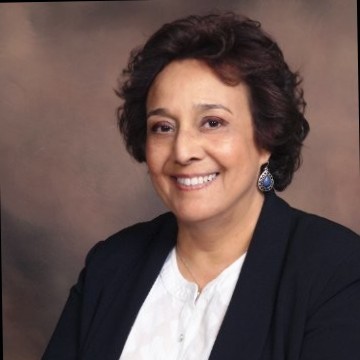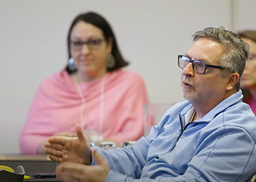Zehra Ahmed: Advocate, Educator & Leader on Asian American, Native Hawaiian & Pacific Islander Heritage Month

Zehra Ahmed, PA-C, MBBS, MS, associate professor and SHP global & cultural chair at the New York Institute of Technology (NYIT) PA Program, is a passionate advocate for her students, colleagues, and the PA profession at large. Read our conversation with Zehra to learn about her journey to PA education, how she supports students who are struggling, and why she believes it’s vital for members of the Asian American, Native Hawaiian & Pacific Islander communities to share their stories.
Tell us about your journey to PA education:
My journey in medicine began in Sri Lanka, where I grew up, and my journey to PA education has not been a very direct one. My family and I immigrated to the U.S. in 1974, and I went to high school, undergraduate, and college here. I returned to Sri Lanka and trained as a physician and completed my residency in women’s health and pediatrics. After I got married, my husband’s career took us to many different countries. We lived in Malaysia for about 10 years and in Pakistan where he’s originally from, then back again to Sri Lanka.
I returned with my family to New York with our daughters in 2001, and I was introduced to the PA profession by a friend. I went through PA school around the age of 40, and it was the best thing that ever happened to me. Honestly, I have never looked back. It has opened up so many opportunities, allowed me to stay close to my family, and continue to work in medicine, which has been my passion for as long as I can remember. I am so proud to be part of a profession that has answered an enormous need in the healthcare of our country. The amazing impact PAs have had during this pandemic is yet further validation of how important we are to the future improvement of our healthcare system nationwide. As a global citizen, I am also proud that it is a model that many other countries have and continue to adopt.
What was the transition like from practicing PA to PA educator?
I was always interested in becoming an educator, I just expected to do it further down the line. Just a few years after my graduation, my professors from NYIT actually called me because they were looking to add a faculty member to the program. It was very scary because teaching is a whole different ballgame. At first, when I was standing in front of 36 students, I thought, “I’d rather be working in the emergency room by myself at night than stand in front of them and teach them.” But soon I grew to love having the chance to give back. I’ve found you can really make a difference in students’ lives, and that’s amazing.
Tell us about the Diversity, Equity, and Inclusion initiatives that you’re a part of.
Since 2009, I’ve been teaching PA OT, PT, nursing, and medical students about health disparities and cultural humility through the Global Health Certificate. Today, I’m part of the DEI Task Force at NYIT, and we’ve done a great deal of work. We have reviewed and implemented a DEI training for all faculty and staff, DEI taskforce members are currently undergoing training themselves, using resources made available by the university, and disseminated a climate survey that we have identified after some deliberation to all students, faculty, and staff across all campuses. Additionally, there are numerous DEI dialogues being held throughout the months that are open to all of the NYIT community. Saying something or speaking out when we see injustice is one thing, but you need to follow up with actions. Outside of NYIT, I am a member of the Inclusion Allies Coalition, which is a group of organizations and practitioners committed to diversity, equity, and inclusion within organizations and society.
What does Asian American, Native Hawaiian & Pacific Islander Heritage Month mean to you?
This month gives us the opportunity to look at our history, because history is so important in so many aspects – to know who we are, where we’ve come from, what our challenges or struggles have been – and most of all, what our accomplishments have been, even though we’ve had those struggles and challenges. Knowing the history is not just important for us, but for everybody, so we understand each other. May is an important month for the AAPI community, but it shouldn’t be the only time we reflect on and celebrate our heritage. That goes for other observances like Black History Month and Pride Month. We need to remember those things all the time – every day.
Why is it so important for members of the Asian American, Native Hawaiian & Pacific Islander communities to share their stories?
It’s important for us to share our struggles as inspiration to others – from younger generations to our colleagues. It’s amazing how people can be struggling, no matter what the age, especially at this time with COVID, and no one would ever know. It’s inspiring to be honest – to let people see that if you can do it, they can do it too. You have to have the courage to share your stories so that others will have the courage to share theirs. Because of where I am in my career and my life, I feel I have that obligation to be the first, if the opportunity arises. And I’m not afraid to do that.
What would you say to a student who is struggling?
When a student is struggling, I always ask them to remember why they started, because PA school is hard. With that memory, I tell them, “Don’t doubt yourself – you can do this.” Then, there are some students to whom “life happens” – who have a parent who’s really sick, or they have a family, they’re married, they have kids, or are struggling with other personal issues. I say, “Okay, let’s take some time, take a breather and step back. Because taking a break is not the end of the world.” As PA educators, it is our responsibility to guide every student in their path to success.
If you could tell your younger self anything, what would you say?
For a long time, I had regrets about things I did or didn’t do, or the time it took to get where I am today. But I’ve realized that I had to go through things a certain way to have the understanding and to be who I am now. So, I would say, “Go with your heart. Do what you have to do. Have the courage to be who you are. Make the best decisions with what you have.” I truly believe that is what I have always done, so I’m finally letting go of regret…almost.
What are you proudest of in your career?
I’m proudest of the impact I have had on the people that I have worked with – patients and students. It’s not just about the medicine, the treatment, the diagnosis – it’s about the human connection you have with your patients – that you made the experience less scary or made them feel they were safe. My proudest moments as an educator have been when students would come back to me, even as alumni from five, six, sometimes 10 years ago, and share a memory of their time in the program and how I helped them through a difficult time in their lives. It makes me proud to know I’ve made an impact.



